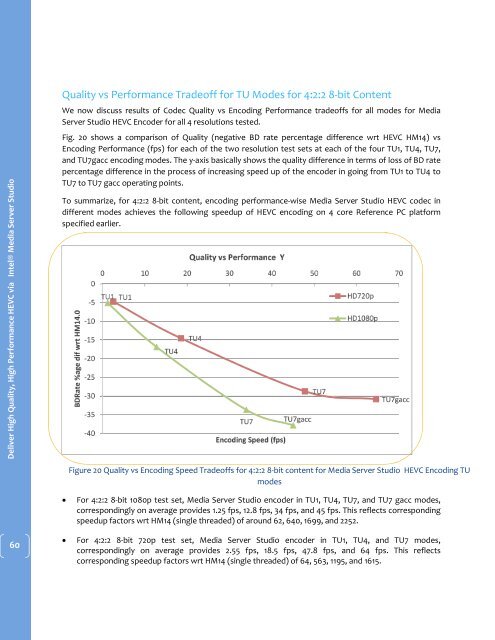You also want an ePaper? Increase the reach of your titles
YUMPU automatically turns print PDFs into web optimized ePapers that Google loves.
<strong>Deliver</strong> <strong>High</strong> <strong>Quality</strong>, <strong>High</strong> <strong>Performance</strong> <strong>HEVC</strong> <strong>via</strong> <strong>Intel®</strong> <strong>Media</strong> <strong>Server</strong> <strong>Studio</strong><br />
<strong>Quality</strong> vs <strong>Performance</strong> Tradeoff for TU Modes for 4:2:2 8-bit Content<br />
We now discuss results of Codec <strong>Quality</strong> vs Encoding <strong>Performance</strong> tradeoffs for all modes for <strong>Media</strong><br />
<strong>Server</strong> <strong>Studio</strong> <strong>HEVC</strong> Encoder for all 4 resolutions tested.<br />
Fig. 20 shows a comparison of <strong>Quality</strong> (negative BD rate percentage difference wrt <strong>HEVC</strong> HM14) vs<br />
Encoding <strong>Performance</strong> (fps) for each of the two resolution test sets at each of the four TU1, TU4, TU7,<br />
and TU7gacc encoding modes. The y-axis basically shows the quality difference in terms of loss of BD rate<br />
percentage difference in the process of increasing speed up of the encoder in going from TU1 to TU4 to<br />
TU7 to TU7 gacc operating points.<br />
To summarize, for 4:2:2 8-bit content, encoding performance-wise <strong>Media</strong> <strong>Server</strong> <strong>Studio</strong> <strong>HEVC</strong> codec in<br />
different modes achieves the following speedup of <strong>HEVC</strong> encoding on 4 core Reference PC platform<br />
specified earlier.<br />
BDRate %age dif wrt HM14.0<br />
0<br />
-5<br />
-10<br />
-15<br />
-20<br />
-25<br />
-30<br />
-35<br />
-40<br />
TU1<br />
TU1<br />
TU4<br />
<strong>Quality</strong> vs <strong>Performance</strong> Y<br />
0 10 20 30 40 50 60 70<br />
TU4<br />
TU7<br />
Encoding Speed (fps)<br />
TU7gacc<br />
TU7<br />
HD720p<br />
HD1080p<br />
TU7gacc<br />
Figure 20 <strong>Quality</strong> vs Encoding Speed Tradeoffs for 4:2:2 8-bit content for <strong>Media</strong> <strong>Server</strong> <strong>Studio</strong> <strong>HEVC</strong> Encoding TU<br />
modes<br />
60<br />
<br />
<br />
For 4:2:2 8-bit 1080p test set, <strong>Media</strong> <strong>Server</strong> <strong>Studio</strong> encoder in TU1, TU4, TU7, and TU7 gacc modes,<br />
correspondingly on average provides 1.25 fps, 12.8 fps, 34 fps, and 45 fps. This reflects corresponding<br />
speedup factors wrt HM14 (single threaded) of around 62, 640, 1699, and 2252.<br />
For 4:2:2 8-bit 720p test set, <strong>Media</strong> <strong>Server</strong> <strong>Studio</strong> encoder in TU1, TU4, and TU7 modes,<br />
correspondingly on average provides 2.55 fps, 18.5 fps, 47.8 fps, and 64 fps. This reflects<br />
corresponding speedup factors wrt HM14 (single threaded) of 64, 563, 1195, and 1615.


